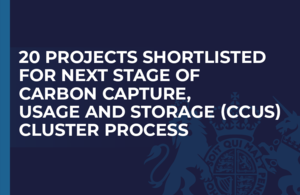UK’s industrial heartlands boosted by next stage of carbon capture clusters
20 projects have been shortlisted for the next stage of the CCUS clusters process

- 20 projects shortlisted for next stage of carbon capture, usage and storage (CCUS) cluster process
- projects located in the North East, Humber, North West England and North Wales set to benefit from government funding
- CCUS is a key technology in the UK’s transition to net zero, which involves capturing and storing carbon emissions from industrial and power generation processes
20 innovative projects have been shortlisted for the next stage of the CCUS clusters process, representing an important step towards a net zero economy.
The UK has one of the largest potential carbon dioxide storage capacities in Europe, making it one of the most attractive business environments for CCUS technology. This is thanks to an unrivalled asset – the North Sea, which can be used to store captured carbon under the seabed. The UK government’s commitment to support CCUS UK-wide could help to create 50,000 skilled jobs in the UK by 2030.
Today’s shortlist follows the commitment in the Prime Minister’s Ten Point Plan for a Green Industrial Revolution, to deploy CCUS in 2 industrial clusters by the mid-2020s, and a further 2 clusters by 2030. These clusters will support the government’s ambitions to decarbonise industry and put the UK at the forefront of the growing carbon capture market. In November 2021, the HyNet cluster in North West England and North Wales, and the East Coast Cluster in the Teesside and Humber were selected as Track 1 clusters, for deployment by the mid-2020s. These clusters will be the first to be considered for support under the government’s CCUS Programme, which includes the £1 billion CCS Infrastructure Fund (CIF).
The shortlisted projects will now also be considered for government funding support to join one of these clusters, to use carbon capture technology to help decarbonise their businesses.
The 20 projects announced today represent a range of innovative CCUS technologies that will capture carbon emissions, preventing them being released into the atmosphere. Carbon capture technologies offer enormous economic potential for these regions, helping to attract new private investment and support new job opportunities.
Read the full list of shortlisted projects.
Notes to editors
- CCUS is a key technology for net zero that involves capturing and storing carbon emissions from industrial processes. The government is determined to see the UK become a world-leader in CCUS technology, helping to attract new private capital into the UK to develop new green technologies and drive forward the UK’s green industrial revolution
- a CCUS cluster in Track 1 is a carbon dioxide transport and storage network of onshore pipelines, offshore pipelines and an associated offshore storage facility and at least 2 CO2 capture projects
- the Prime Minister’s 10 Point Plan for a Green Industrial Revolution established a commitment to deploy CCUS in a minimum of 2 industrial clusters by the mid-2020s, and 4 by 2030 at the latest. The CCUS cluster sequencing process is how the government plans to meet this commitment
- the UK government’s commitment to support CCUS economy-wide could help to create 50,000 jobs in the UK by 2030
- today’s announcement is a shortlist of projects that will proceed to the next stage of the process, for consideration for government support under Track 1 of the CCUS cluster sequencing process. It is not the final list of projects that will receive government support, and does not imply availability of funding for any or all of the shortlisted projects
- further information on the final confirmed projects for Phase 2 will be shared in due course